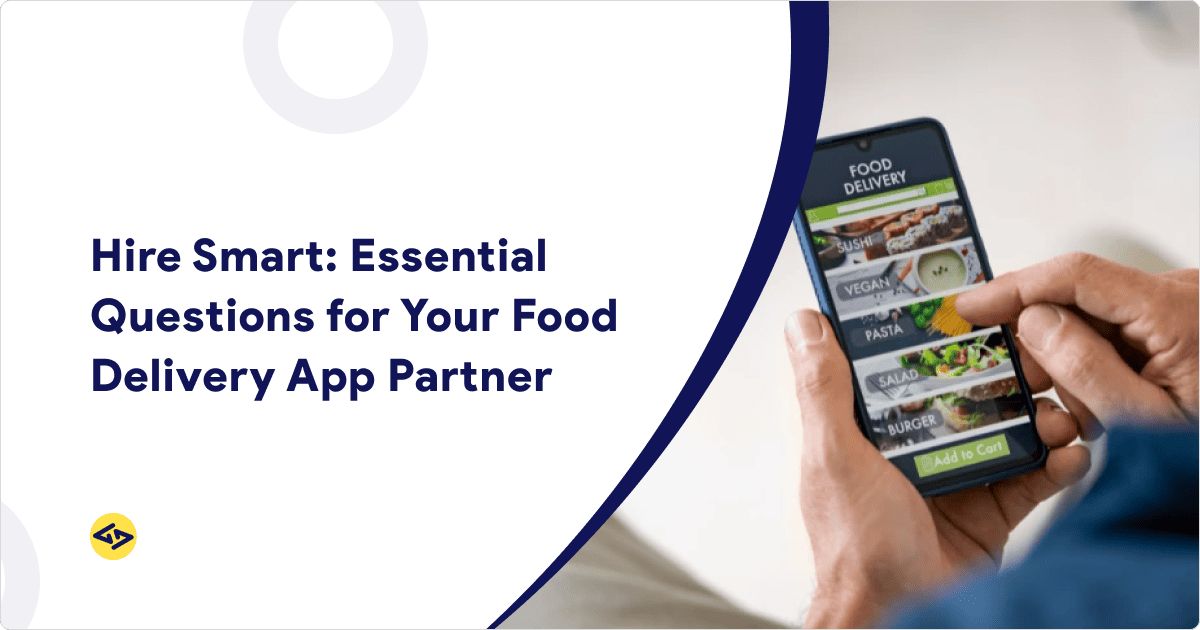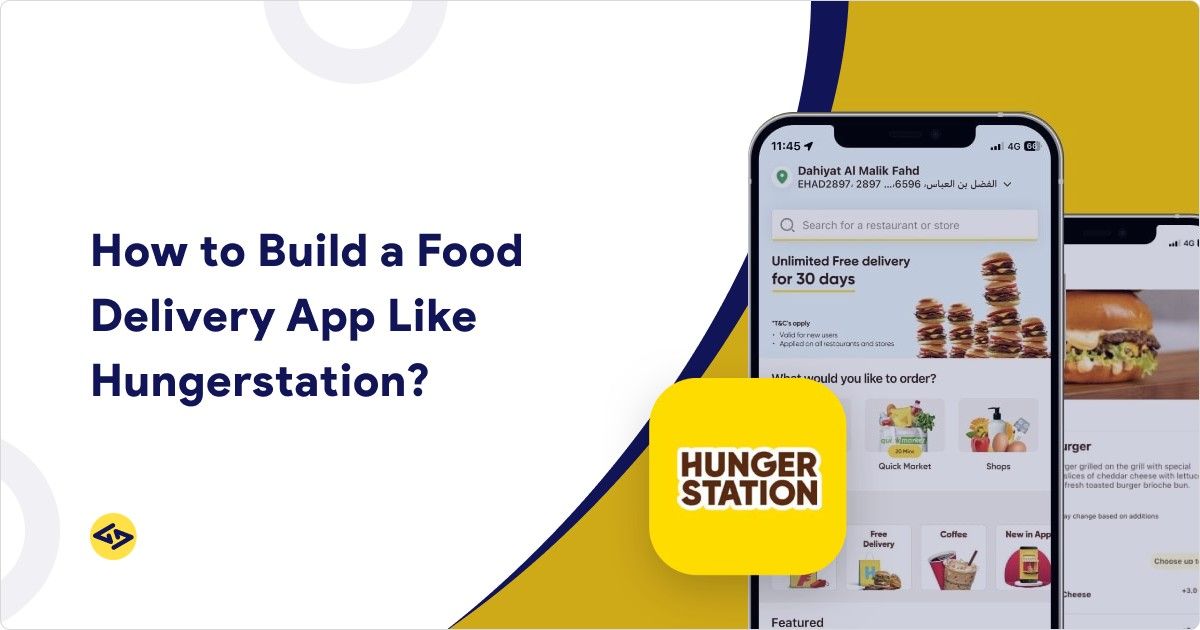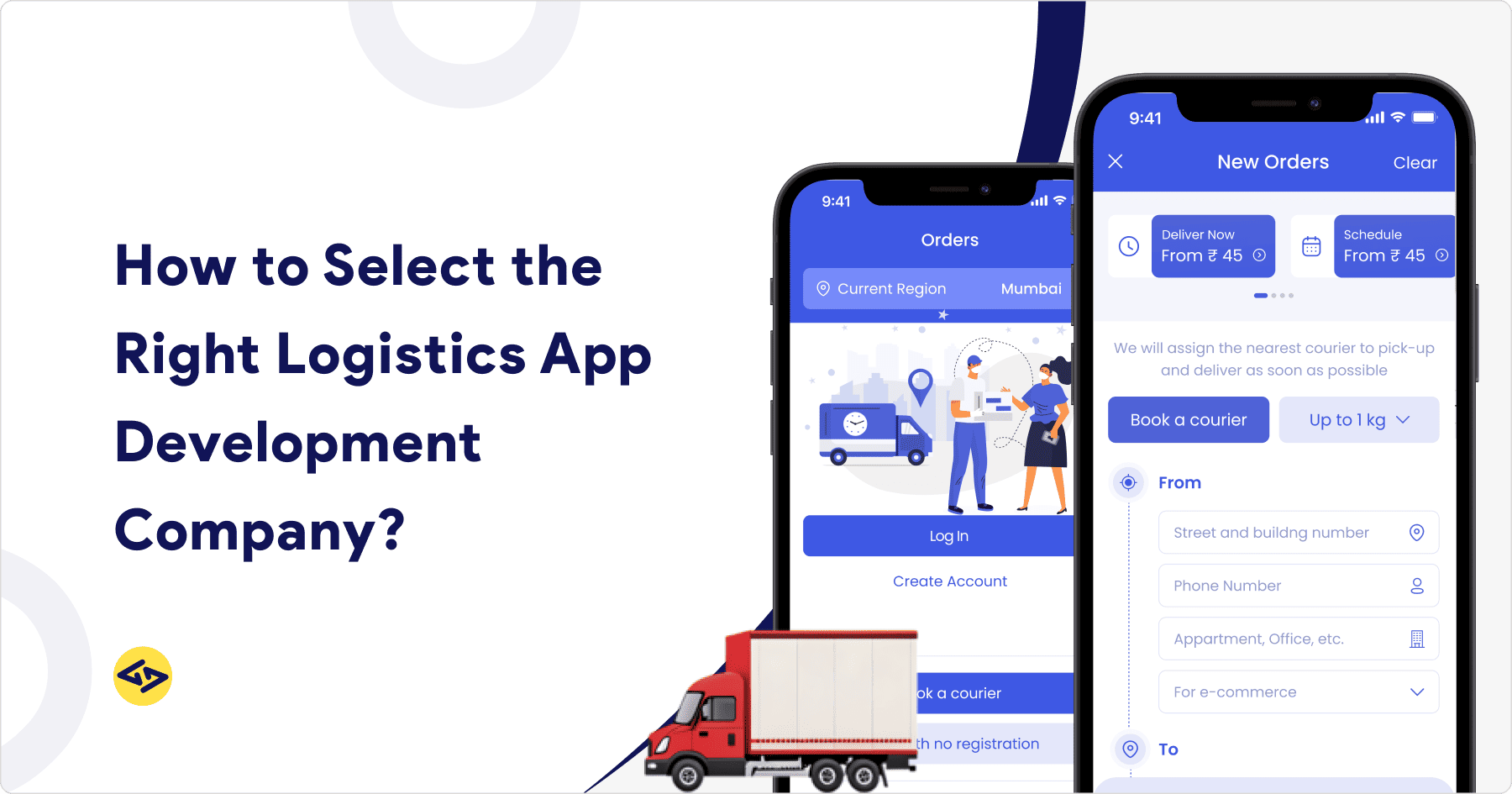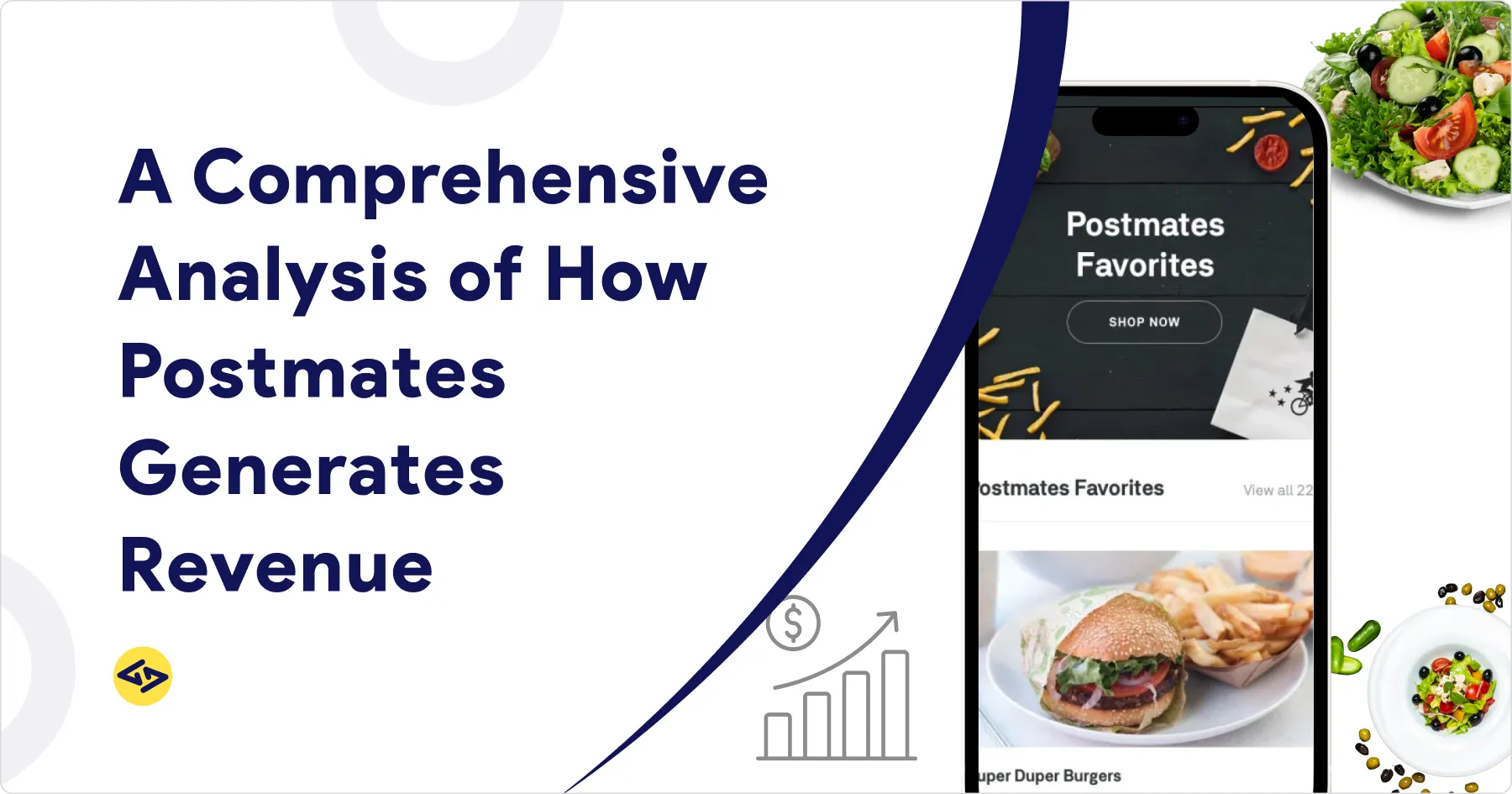Table of Contents
- Why Asking the Right Questions Matters
- Market Statistics of the Online Food Delivery Industry
- Key Questions to Ask Before Choosing Your Food Delivery App Development Partner
- 1. What experience do you have in food delivery app development?
- 2. Can you share live examples or case studies of your previous work?
- 3. What technologies and frameworks do you use?
- 4. How do you approach UI/UX design for food delivery apps?
- 5. What key features do you recommend for a competitive food delivery app?
- 6. What is your development and testing process?
- 7. How do you ensure app security and data privacy?
- 8. What is your project timeline and pricing model?
- 9. Do you offer post-launch support and updates?
- 10. How do you plan for scalability and business growth?
- Mistakes to Avoid When Hiring a Food Delivery App Development Company
- Red Flags to Watch For
- Conclusion: Make an Informed Choice for Long-Term Success
- Let’s Build Your Food Delivery App
Why Asking the Right Questions Matters
Hiring a food delivery app development company is a big decision. Your entire business depends on how well the app performs. That’s why asking the right questions isn’t optional — it’s essential.
Good questions help you understand the company’s real capabilities. You learn how they build apps, how they communicate, and how they handle challenges. Most importantly, you find out whether they truly understand the food delivery industry.
Food delivery apps are complex. They need smooth user journeys, fast loading times, accurate order tracking, secure payment methods, and robust backend support. Only an experienced food delivery app developer can deliver all of this without compromise.
The right questions also save you from risk. They help you avoid hidden costs, vague commitments, poor-quality work, and unreliable agencies. When you know what to ask, you choose developers who are transparent, skilled, and committed to your success.
In simple words:
Good questions lead to better decisions. Better decisions lead to a better app.
This is why you must be prepared before hiring app developers or partnering with a delivery app agency.
Market Statistics of the Online Food Delivery Industry
Global Market Overview
The online food delivery market continues to experience strong growth, driven by rising smartphone usage, improved internet access, and changing consumer lifestyles.
Global Revenue (2025): USD 1.40 trillion
Projected CAGR (2025–2030): 7.63%
Estimated Market Volume (2030): USD 2.02 trillion
Online Food Delivery Market Summary
The global market size was valued at USD 288.84 billion in 2024 and is projected to reach USD 505.50 billion by 2030, registering a CAGR of 9.4% (2025–2030).
The surge is primarily fueled by:
Widespread smartphone and internet penetration
Growing consumer preference for convenience
Expansion of third-party delivery platforms and restaurant partnerships
Key Market Trends & Insights
Regional Share:
North America accounted for over 27% of the global market in 2024.
The U.S. market is expected to grow at a CAGR of 9.6% from 2025–2030.
Asia Pacific remains the fastest-growing market, driven by rising urbanization and expanding food tech ecosystems.
By Type:
Platform-to-Consumer segment dominated with over 71% share in 2024.
By Product:
Meal Delivery led the market with 64% share in 2024.
By Payment Method:
Online Payments dominated with 67% share in 2024, reflecting a growing preference for digital transactions.
Key Questions to Ask Before Choosing Your Food Delivery App Development Partner
Building a successful food delivery business starts with choosing the right tech partner. The company you hire will determine how your app performs, scales, and engages users. Asking the right questions ensures your partner aligns with your business goals — both technically and strategically.
Here are several important questions to ask before hiring an app development company.
1. What experience do you have in food delivery app development?
Experience matters — especially in a fast-moving, customer-driven market like food delivery. You don’t want a general mobile app developer; you need a partner who understands the ecosystem.
Ask how many food delivery apps they’ve built and for what kind of businesses — restaurants, cloud kitchens, or multi-vendor marketplaces. Experienced developers already know the industry’s core challenges: live tracking, multi-role access (customer, driver, restaurant, admin), and real-time notifications.
An experienced food delivery app specialist already understands logistics, customer journeys, and delivery workflows — giving your project a smoother, faster start.
For inspiration, check our blog on the top 5 food delivery apps in the USA to see how global leaders operate.
2. Can you share live examples or case studies of your previous work?
Portfolios reveal the truth that presentations can’t. Ask to see case studies, app store links, or demo versions of their earlier food delivery projects.
Don’t just look at design — test the apps. Are they fast? Is the navigation simple? Are features like tracking and payments seamless?
Client testimonials, ratings, and download counts are strong trust indicators. A transparent team will confidently showcase their success stories and explain how its work improved a client’s business performance.
If they avoid sharing past projects, it’s a red flag — they may lack real-world experience.
3. What technologies and frameworks do you use?
Your app’s scalability depends on its tech stack. A reliable development partner uses modern, secure, and flexible technologies.
Ask them:
- Which programming languages do you use (Swift, Kotlin, Flutter, React Native)?
- What backend frameworks support your apps (Node.js, Laravel, Python)?
- How do you handle real-time updates and push notifications?
- Do you integrate third-party APIs like Google Maps or Stripe for payments?
Avoid companies using outdated or unscalable frameworks. The goal is to build a robust foundation that supports growth, upgrades, and integrations down the line.
4. How do you approach UI/UX design for food delivery apps?
Design isn’t just about looks — it’s about creating a smooth, engaging user experience. A great design makes ordering food feel effortless from start to finish.
Ask the development team how they approach the design process. Do they conduct user research before creating screens? Do they build wireframes, interactive prototypes, and perform usability testing to refine the flow?
A user-focused approach ensures the design aligns with real customer behaviors — how people browse menus, customize meals, and track deliveries in real time. Expect a clean interface, quick navigation, and intuitive layouts optimized for easy decision-making.
When your app’s design feels smooth and enjoyable, users are more likely to return — helping you build long-term loyalty and engagement.
5. What key features do you recommend for a competitive food delivery app?
Every food delivery app needs basic features, but the right developer will think beyond the basics. They’ll suggest elements that improve efficiency and user satisfaction.
Essential features include:
- Real-time order tracking
- Push notifications and alerts
- Secure payment options
- Restaurant and menu listings
- Ratings and reviews
- Order history and quick reorders
Advanced features that add value:
- AI-based food recommendations
- Loyalty rewards and coupons
- Multi-language support
- Voice ordering or chatbots
- Contactless delivery preferences
A skilled tech team should help you choose the right feature mix for your business model — whether it’s single-restaurant, multi-vendor, or aggregator-based.
6. What is your development and testing process?
This question separates professionals from freelancers. You need a team that follows a transparent, step-by-step process.
A reliable development team will follow a structured process like this:
- Discovery & Planning – Understanding your goals, target audience, and features.
- Design & Prototype – Creating UI/UX mockups for feedback.
- Development – Writing clean, modular code.
- Testing & QA – Running automated and manual tests for quality assurance.
- Deployment – Launching on the App Store and Play Store.
- Support & Maintenance – Continuous updates and performance monitoring.
Also, ask if they use Agile methodology. Agile keeps communication open and lets you track progress in weekly sprints — ensuring no surprises near the deadline.
7. How do you ensure app security and data privacy?
Food delivery apps process sensitive data — addresses, payment details, and real-time locations. A single breach can cost you customer trust.
Ask what security protocols they follow:
- Do they encrypt all data transmissions?
- How do they store user credentials?
- Are payment gateways PCI DSS-compliant?
- Do they perform penetration and vulnerability testing?
A trusted company focuses on complete security — from database encryption to API protection.
They also ensure compliance with data laws like GDPR to keep your users and business safe.
8. What is your project timeline and pricing model?
Clarity in time and cost prevents future conflicts. A reputable company will give you a clear roadmap with realistic deadlines and transparent pricing.
Ask:
- What is the estimated timeline for each phase (design, development, testing)?
- What is included in the quoted cost?
- Are there any hidden charges for APIs, hosting, or updates?
Avoid choosing the cheapest quote. Cheap development often leads to costly fixes later. Instead, focus on value — experience, communication, and post-launch support.
Remember: a well-built food delivery app is an investment, not an expense.
9. Do you offer post-launch support and updates?
The app’s real journey begins after launch. Bugs, user feedback, and OS updates are all part of long-term success.
Ask if the company provides ongoing support and maintenance services.
This includes:
- Fixing technical glitches or crashes.
- Adding new features.
- Updating to the latest OS versions.
- Monitoring app performance and server uptime.
A dependable technology partner won’t disappear after deployment. They’ll stand by you as your business grows and technology evolves.
10. How do you plan for scalability and business growth?
Scalability defines whether your app can grow with your business. You don’t want to rebuild the entire system when you expand from one city to ten.
Ask how they design for scalability. Do they use modular architecture? Can they handle higher traffic and integrate new features like grocery or medicine delivery?
A forward-thinking team will build with the future in mind. They’ll use cloud infrastructure, scalable APIs, and performance monitoring tools to ensure smooth expansion.
The best developers plan not for where your business is today — but where it will be tomorrow.
If you’re planning to build one, explore our insights on the top food delivery startups to understand what makes leading apps stand out.
Mistakes to Avoid When Hiring a Food Delivery App Development Company
Even after asking the right questions, many entrepreneurs still fall into common traps when building their food delivery app.
Understanding these mistakes early can help you make better decisions and avoid expensive delays or reworks.
1. Choosing Based on Price Alone
Low cost often means low quality.
A cheap quote may look attractive at first, but it can lead to poor design, delayed delivery, and constant bugs.
App development is an investment, not an expense. Paying a bit more for skilled professionals often leads to stronger performance and better long-term results.
Tip: Focus on value, expertise, and support — not just the lowest price tag.
2. Ignoring Industry Experience
Every industry has its own logic. Food delivery apps need real-time tracking, order management, delivery partner coordination, and multiple payment options.
A team with no experience in food tech may struggle to meet these demands.
Tip: Always check if the company has built food or delivery apps before. Ask for examples or client success stories.
3. Vague Project Scope or Timeline
Unclear timelines lead to confusion, delays, and extra costs.
Without a defined scope, it’s easy for the project to drift or exceed your budget.
Tip: Ask for a detailed roadmap with clear milestones, deliverables, and communication checkpoints before signing a contract.
4. Overlooking Post-Launch Support
Many businesses focus only on getting the app built — and forget about what comes after launch.
Without proper support, you’ll struggle with bugs, updates, or server issues once users start downloading.
Tip: Make sure your delivery app agency offers maintenance, updates, and emergency technical support.
5. Not Checking Reviews or References
Skipping background checks is a common mistake.
Client testimonials and online reviews offer real-world insights into reliability and service quality.
Tip: Always ask for client references, case studies, or verified reviews before you hire app developers.
Red Flags to Watch For
While mistakes are often made by clients, red flags usually come from the development partner’s side. Spotting these early can save your business from major trouble later.
1. Lack of Transparency
If the company avoids talking about costs, process, or project ownership, that’s a warning sign.
Trustworthy agencies are always clear about pricing, contracts, and communication.
2. Poor or Delayed Communication
Slow replies, vague answers, or lack of updates signal poor project management.
Smooth communication is the backbone of successful collaboration.
3. Overpromising Results
Be cautious if someone promises an advanced food delivery app in a few weeks for a surprisingly low price.
Good apps take time, testing, and teamwork.
4. No Client References or Portfolio
Reputable companies proudly share their past work.
If an agency refuses to show previous projects or testimonials, take it as a red flag.
5. No Focus on Security or Testing
Every food delivery app handles sensitive data — from personal details to payment information.
If security isn’t discussed upfront, walk away.
Recognizing these mistakes and red flags early will help you choose a development partner that’s transparent, reliable, and genuinely invested in your success.
Conclusion: Make an Informed Choice for Long-Term Success
Building a food delivery app isn’t just a tech project — it’s a long-term business investment.
Choosing the right development partner plays a crucial role in your platform’s success in today’s competitive market.
When you ask the right questions, avoid common mistakes, and recognize early red flags, you set your project up for success.
A reliable development partner will understand your goals, recommend the right technology, and deliver an app that performs flawlessly — from first click to final delivery.
Whether you’re launching a new food delivery startup or scaling your existing service, make sure you partner with experts who know the industry inside out.
Hire expert food delivery app developers at iCoderz — and turn your idea into a seamless, profitable, and scalable food delivery solution that stands out in the market.
Contact us today.
Let’s Build Your Food Delivery App
Get a free checklist covering all the key questions to ask before hiring a food delivery app development company.




